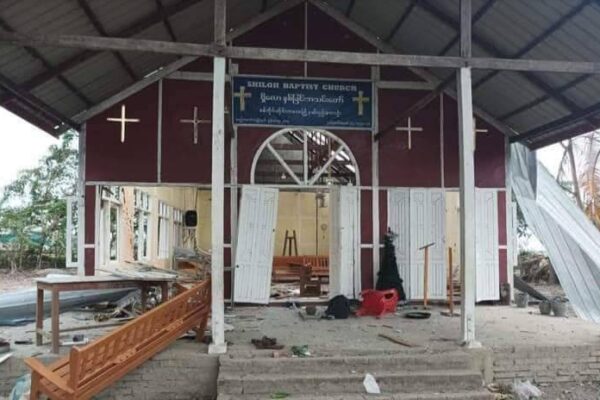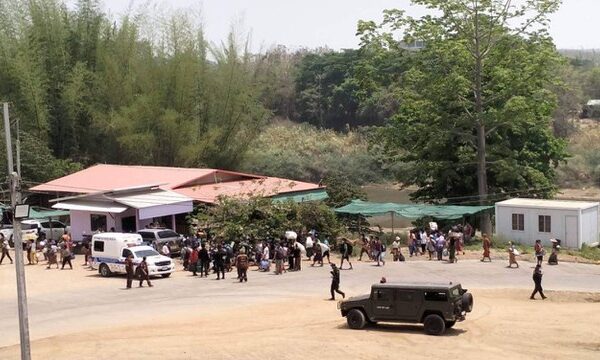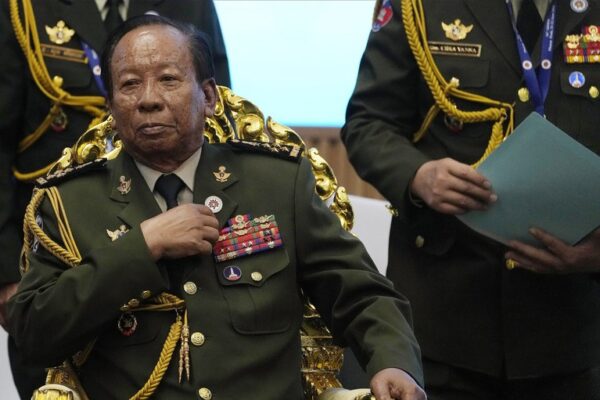Holding out hope for a ‘spring’ free from China’s repression
While spring has arrived in the Northern Hemisphere, Uyghurs in China’s northwestern Xinjiang region are still waiting for their spring to arrive, when they will be delivered from the repression of China’s government. That’s the main sentiment expressed in a new online collection of 15 poems and short stories by writers with connections to East Turkistan, Uyghurs’ preferred name for Xinjiang. The Asian American Writers’ Workshop released “Spring Will Come: Writings from East Turkistan” on March 20, the eve of the Nowruz Festival, when Uyghurs and other Turkic Muslims in Xinjiang celebrate the end of an old year and the beginning of a new one on the day of the vernal equinox, which usually takes place on March 21. The writings reflect the impacts of colonialism, lessons learned from past failures, and warnings for the future. They also deal with spiritual resistance, determination, adherence to one’s goals, and hope for freedom. “[T]hrough the title ‘Spring Will Come,’ we express our desire and belief that we cannot live in cruel winter forever and that spring will come to our land eventually,” said Munawwar Abdulla, a researcher at Harvard University who translated some of the contributions. The “cruel winter” she refers to is China’s repression of Uyghurs and other Turkic minorities in Xinjiang since 2017. At that time, authorities began detaining Uyghurs in “re-education” camps where they were forced to learn Mandarin Chinese and sometimes subjected to torture, sexual assaults and forced labor. Despite evidence and witness testimony about the abuse, Beijing has vehemently maintained that the camps were vocation training centers to prevent religious extremism and terrorism in the restive region. “Spring is the message of hope, resistance, resilience, and all good stuff.” Abdulla said. When will winter be over? The collection begins with famous Uyghur poet Abdurehim Ötkür’s poem “Calling Out for Spring,” the first stanza of which reads: When will this bitter winter be over? I call out for Spring with my every breath. Like a lion roaring in pain in the night, I cry out for Spring to arrive. The publication comes as calls mount for the international community to take concrete measure to hold China accountable for what the United States government and several Western parliaments have said amount to genocide and crimes against humanity. The works also serve as a refutation of the Chinese government’s efforts to wipe out Uyghur culture, language and religion in an effort to Sinicize the region. Amid the crackdown in recent years, authorities have detained in the camps and in prisons Uyghur intellectuals, including writers and artists, prominent business people, notable sports figures, Islamic clergymen and academics. “When more people in the world recognize that the Uyghur people have become genocide victims, it is important to let the world know that Uyghur people are a civilized people with a unique culture,” said Rahima Mahmut, a UK-based artist who also translated some of the pieces in the collection. “They have writers, poets, artists, and talented people in every field,” she told Radio Free Asia. “China has portrayed Uyghurs as uneducated, uncivilized people who must be ‘re-educated.’ They have been making such efforts to paint Uyghurs in a negative light for many years. That is the main purpose of publishing this collection.” Voices of the diaspora The collection includes poems written in the 1940s in Xinjiang and ones written in English by diaspora Uyghurs as late as last year, said Mahmut, who also serves as UK director for the World Uyghur Congress, a Uyghur rights group. “It manifests the connection diaspora Uyghurs have with their homeland,” she said. The poem “My Plea” by Ilminur, known among diaspora Uyghurs as Efvan, is based on the 2017 crackdown in which her relatives were caught up. The first stanza reads: Oh, Heavenly Mountains, Behind you are corpses, Before you is troubled silence. How many rivers are flowing deep red Within your valleys? Oh, rebellious savage wolves, Will your howl save the world? Chinese authorities took Ilminur’s parents to the camps and sentenced other relatives to 10-to 18-year prison terms, she said. “These events impacted me deeply, and I wrote this poem hoping that our land under the heavenly mountain will be free,” Ilminur told RFA. Ilminur, who illustrates Uyghur children’s books and magazines in the diaspora, provided bright sketches for the collection of works that evokes a sense of home and hope. Her favorite drawing depicts three Uyghur women making round flatbread, or naan, by hand and placing it in an over. The drawing accompanies Abdushukur Muhammet’s poem “The Road Home.” “I feel good whenever I see this picture because I immediately think of my home and mother, Ilminur said. “Any sensible person will remember his mother, his home, when he sees it and feel the warmth.” ‘Light in the darkness’ Mahmut, the UK-based artist,said she was particularly moved by Ilminur’s poem and Abdurrahim Imin’s poem, “The Beloved Will Come.” Efvan’s poem “depicted the reality that our people are suffering tremendously, and the world turned deaf,” said Mahmut. Imin’s poem, meanwhile, expresses hope that despite hardship and oppression, there must come a beautiful time when Uyghurs will be free. “That poem gives our readers hope and tells them there is a light in the darkness, and we will get our liberty one day, and we can be free,” Mahmut said. Mahmut and Abudulla were involved in the project from start to finish, collecting writings, translating them to English, and editing them after the Asian American Writers’ Workshop first contacted them about the compilation in June 2022. Other works in the collection are “If Needed” by Muyesser Abdulehed, “Elegy for a Home Besieged” by Munawwar Abdulla, writer Zunun Qadiri’s short story “The Edict,” and contributions by Uyghur writers currently in prison in Xinjiang, including Abduqadir Jalalidin’s “Boredom” and Perhat Tursun’s “Guest.” The collection also includes pieces by two Kazakh writers. “The global community must not just see our cries for help, our misery, and suffering,” Mahmut said. “I hope they also feel by reading our poets’…







